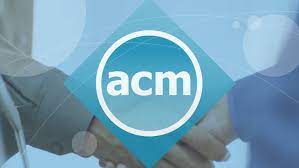ACM: Association for Computing Machinery
ACM is an abbreviation of the “Association for Computing Machinery (ACM)”.
It is an international academic association or scholarly society for computing. In 1947, it was established. It is the world’s largest scientific and educational computing society. The ACM is a non-profit professional membership association, as of 2019, claiming just about 100,000 students and professional members. Its head office is situated in New York City.
History
- In 1947, the ACM was established under the name Eastern Association for Computing Machinery.
- The name was changed in the subsequent year to the Association for Computing Machinery.
Infrastructure
ACM has five “Boards” that creates a variety of committees and subgroups, to facilitate Head offices employees and workforce to keep up quality services and products.
These boards are given below as follows:
- Publications Board
- SIG Governing Board
- Education Board
- Membership Services Board
- Practitioners Board
Services in Publication
Over 50 journals are published by ACM comprising:
- The prominent Journal of the ACM
- Two general magazines for computer professionals
- Communications of the ACM (also known as Communications or CACM)
- Queue
Other publications of the ACM comprise:
- ACM XRDS, previously “Crossroads”, was redesigned in 2010 and is the most well-liked student computing magazine in the US.
- ACM Interactions, an interdisciplinary HCI publication paid attention to the associations among experiences, people and technology, and the third-largest ACM publication.
- ACM Computing Surveys (CSUR)
- Computers in Entertainment (CIE)
- ACM Journal on Emerging Technologies in Computing Systems (JETC)
- ACM Special Interest Group: Computers and Society (SIGCAS)
Several journals, particular to subfields of computer science, titled ACM Transactions. A number of the additional noteworthy and prominent transactions comprise:
- ACM Transactions on Computer Systems (TOCS)
- IEEE/ACM Transactions on Computational Biology and Bioinformatics (TCBB)
- ACM Transactions on Computational Logic (TOCL)
- ACM Transactions on Computer-Human Interaction (TOCHI)
- ACM Transactions on Database Systems (TODS)
- ACM Transactions on Graphics (TOG)
- ACM Transactions on Mathematical Software (TOMS)
- ACM Transactions on Multimedia Computing, Communications, and Applications (TOMM)
- IEEE/ACM Transactions on Networking (TON)
- ACM Transactions on Programming Languages and Systems (TOPLAS)
Awards
The ACM presents or co-presents a number of awards for exceptional and stupendous technical and professional achievements and contributions in computer science and information technology:
- ACM A. M. Turing Award
- ACM – AAAI Allen Newell Award
- ACM Athena Lecturer Award
- ACM/CSTA Cutler-Bell Prize in High School Computing
- ACM Distinguished Service Award
- ACM Doctoral Dissertation Award
- ACM Eugene L. Lawler Award
- ACM Fellowship, awarded annually since 1993
- ACM Gordon Bell Prize
- ACM Grace Murray Hopper Award
- ACM – IEEE CS George Michael Memorial HPC Fellowships
- ACM – IEEE CS Ken Kennedy Award
- ACM – IEEE Eckert-Mauchly Award
- ACM India Doctoral Dissertation Award
- ACM Karl V. Karlstrom Outstanding Educator Award
- ACM Paris Kanellakis Theory and Practice Award
- ACM Policy Award
- ACM Presidential Award
- ACM Prize in Computing (formerly: ACM – Infosys Foundation Award in the Computing Sciences)
- ACM Programming Systems and Languages Paper Award
- ACM Student Research Competition
- ACM Software System Award
- International Science and Engineering Fair
- Outstanding Contribution to ACM Award
- SIAM/ACM Prize in Computational Science and Engineering
Over 30 of ACM’s Special Interest Groups also award individuals for their contributions with a small number of awards listed below in the following list:
- ACM Alan D. Berenbaum Distinguished Service Award
- ACM Maurice Wilkes Award
- ISCA Influential Paper Award
Chapters
ACM has three types of chapters:
- Special Interest Groups
- Professional Chapters
- Student Chapters
As of 2011, ACM has professional & SIG Chapters in 56 countries.
As of 2014, there are present ACM student chapters in 41 different countries.
Special Interest Groups
- SIGACCESS: Accessible Computing
- SIGACT: Algorithms and Computation Theory
- SIGAda: Ada Programming Language
- SIGAI: Artificial Intelligence
- SIGAPP: Applied Computing
- SIGARCH: Computer Architecture
- SIGBED: Embedded Systems
- SIGBio: Bioinformatics
- SIGCAS: Computers and Society
- SIGCHI: Computer–Human Interaction
- SIGCOMM: Data Communication
- SIGCSE: Computer Science Education
- SIGDA: Design Automation
- SIGDOC: Design of Communication
- SIGecom: Electronic Commerce
- SIGEVO: Genetic and Evolutionary Computation
- SIGGRAPH: Computer Graphics and Interactive Techniques
- SIGHPC: High Performance Computing
- SIGIR: Information Retrieval
- SIGITE: Information Technology Education
- SIGKDD: Knowledge Discovery and Data Mining
- SIGLOG: Logic and Computation[23]
- SIGMETRICS: Measurement and Evaluation
- SIGMICRO: Microarchitecture
- SIGMIS: Management Information Systems
- SIGMM: Multimedia
- SIGMOBILE: Mobility of Systems, Users, Data and Computing
- SIGMOD: Management of Data
- SIGOPS: Operating Systems
- SIGPLAN: Programming Languages
- SIGSAC: Security, Audit, and Control
- SIGSAM: Symbolic and Algebraic Manipulation
- SIGSIM: Simulation and Modeling
- SIGSOFT: Software Engineering
- SIGSPATIAL: Spatial Information
- SIGUCCS: University and College Computing Services
- SIGWEB: Hypertext, Hypermedia, and Web
 Lifeyet News Lifeyet News
Lifeyet News Lifeyet News





